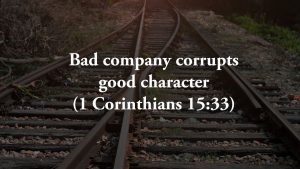Welcome to Day 1499 of our Wisdom-Trek, and thank you for joining me.
This is Guthrie Chamberlain, Your Guide to Wisdom
Bible Study – Use of Common Language – Meditation Monday
Wisdom – the final frontier to true knowledge. Welcome to Wisdom-Trek! Where our mission is to create a legacy of wisdom, to seek out discernment and insights, to boldly grow where few have chosen to grow before. Hello, my friend; I am Guthrie Chamberlain, your captain on our journey to increase Wisdom and Create a Living Legacy. Thank you for joining us today as we explore wisdom on our 2nd millennium of podcasts. This is Day 1499 of our Trek, and it is time for Meditation Monday. Taking time to relax, refocus, and reprioritize our lives is crucial in order to create a living legacy. For you, it may just be time alone for quiet reflection. You may utilize structured meditation practices. In my life, Meditation includes reading and reflecting on God’s Word and in prayer. It is a time to renew my mind, refocus on what is most important, and making sure that I am nurturing my soul, mind, and body. As you come along with me on our trek each Meditation Monday, it is my hope and prayer that you, too, will experience a time for reflection and renewing of your mind.
We are continuing our series this week on Meditation Monday as we focus on Mastering Bible Study through a series of brief insights from Hebrew Scholar, Dr. Michael S. Heiser. Our current insights are focusing on what the Bible is. Today let us meditate on:
Bible Study – Use of Common Language
· Insight Twenty-Nine: There Is No Such Thing as “Holy Ghost Greek”
 The New Testament was originally written in Greek. Like every language. Greek changes over time in script, word meanings, and grammar. Contemporary spoken and written English has significant differences from English of prior eras. This is most easily seen in vocabulary. Fifty years ago, words like “blog.” “‘Facebook,’ and “chatroom’ didn’t exist in English. There are also differences, for example, between British and American English. So it should come as no surprise that the Greek of the New Testament is different than Greek of other periods.
The New Testament was originally written in Greek. Like every language. Greek changes over time in script, word meanings, and grammar. Contemporary spoken and written English has significant differences from English of prior eras. This is most easily seen in vocabulary. Fifty years ago, words like “blog.” “‘Facebook,’ and “chatroom’ didn’t exist in English. There are also differences, for example, between British and American English. So it should come as no surprise that the Greek of the New Testament is different than Greek of other periods.
These differences, along with the nature of the New Testament, led many people, including scholars, to suppose that the New Testament’s Greek was unique, perhaps even created by divine providence specifically to communicate the truth of the gospel. People took this idea seriously into the late 1800s. Today, it’s known to be a complete falsehood.
This belief’s mythical nature was exposed in the late nineteenth and early twentieth centuries by archaeological discoveries of previously unknown Greek manuscripts. For example, toward the end of the nineteenth century, thousands of papyrus fragments written in Greek were discovered in Egypt in garbage dumps. Greek scholars quickly discerned that the Greek of these fragments was the same type of Greek found in the New Testament and the early church fathers, a stage of the language known as “common Greek, or koinë Greek (pronounced, koinay).”

Koine Greek is a byproduct of Alexander the Great’s conquest. Although Alexander’s soldiers were Greeks, they spoke different versions of the Greek language. There were numerous dialects. A common form of the language was created and spread to communicate with each other effectively. As Alexander’s armies swept east across the Mediterranean, Asia Minor (modern Turkey), Mesopotamia, and India, this common Greek spread throughout his empire. This common (koine) Greek is the language of the New Testament.
There is no such thing as “Holy Ghost Greek.” We ought not to assign any special status to it when we’re doing word studies in our study of Scripture. Doing so leads to a flawed interpretation. Fortunately, the Greek of the New Testament wasn’t unique. It was the Greek spoken and read throughout the known world. Consequently, the message of the New Testament was understood everywhere.
· Insight Thirty: Learn About Hebrew Poetic Parallelism

Don’t worry. I’m not going to tell you that you need to learn Hebrew to do Bible study. (Although Dr. Heiser is admittedly biased in that direction).
There’s a lot of poetry in the Old Testament. Hebrew poetry doesn’t work like poetry as we think of it. The kind of poetry we’re exposed to in school or maybe on greeting cards rhymes in sound:
Mary had a little lamb. Its fleece was white as snow.
And everywhere that Mary went, the lamb was sure to go.
Hebrew poetry, on the other hand, rhymes in thought. That is, the second (or successive) line in Hebrew poetry will echo the first in some way. That’s very handy to know for Bible study in books like Psalms and Proverbs. Modern English translations do an excellent job of aligning Hebrew poetry so that the English reader can tell what lines immediately relate to one another. If we can discern that interpretation can proceed to how the lines are echoing each other with the eye. Scholars typically express this phenomenon with the advice, “Line A is explained more with Line B. Line A says something; then line B elaborates.” The only trick is that the thought-rhyming can be accomplished in a wide range of ways. Some examples will illustrate this.
Psalm 119:105 (A and B are synonymous thoughts)
A—Your word is a lamp to my feet,
B—and a light to my path.
Psalm 1:6 (B echoes A, but in opposite terms)
My son,
A—The Lord knows the way of the righteous,
B—but the way of the wicked ‘sill perish.
There are over a dozen options for understanding the relationships between lines of Hebrew poetry. The lines reinforce each other in thought. Parallelism helps us to see elements that are meant to be understood in tandem. Sometimes that’s handy for word study—parallelism is a context for a word’s usage. Having an eye for line relationships in poetry helps Bible students understand the biblical writer’s intended idea and weed out unintended interpretations.
Study this Book of Instruction continually. Meditate on it day and night so you will be sure to obey everything written in it. Only then will you prosper and succeed in all you do. That is a wrap for today’s Meditation. Next week we will continue our trek on Meditation Monday as we take time to reflect on what is most important in creating our living legacy. On tomorrow’s trek, we will explore another wisdom quote. This 3-minute wisdom supplement will assist you in becoming healthy, wealthy, and wise each day. Thank you for joining me on this trek called life. Encourage your friends and family to join us and then come along tomorrow for another day of ‘Wisdom-Trek, Creating a Legacy.’
That is a wrap for today’s Meditation. Next week we will continue our trek on Meditation Monday as we take time to reflect on what is most important in creating our living legacy. On tomorrow’s trek, we will explore another wisdom quote. This 3-minute wisdom supplement will assist you in becoming healthy, wealthy, and wise each day. Thank you for joining me on this trek called life. Encourage your friends and family to join us and then come along tomorrow for another day of ‘Wisdom-Trek, Creating a Legacy.’

If you would like to listen to any of the past 1498 daily treks or read the daily Journal, they are available at Wisdom-Trek.com. I encourage you to subscribe to Wisdom-Trek on your favorite podcast player so that each day will be downloaded to you automatically.
Thank you for allowing me to be your guide, mentor, and most importantly, I am your friend as I serve you through this Wisdom-Trek podcast and Journal.
As we take this Trek of life together, let us always:
- Live Abundantly (Fully)
- Love Unconditionally
- Listen Intentionally
- Learn Continuously
- Lend to others Generously
- Lead with Integrity
- Leave a Living Legacy Each Day
I am Guthrie Chamberlain….reminding you to ’Keep Moving Forward,’ ‘Enjoy your Journey,’ and ‘Create a Great Day…Everyday’! See you tomorrow!

 A gentle increase in the room’s lighting simulates the sunrise, while optimized light wavelengths maximize wakefulness and improve your mood. Once you are fully awake, you ask: “Hey Google, how’s my health this morning?” “One moment,” says your digital assistant. It takes thirty seconds for the full diagnostic to run, which is pretty good considering the system deploys dozens of sensors capturing gigabytes of data.
A gentle increase in the room’s lighting simulates the sunrise, while optimized light wavelengths maximize wakefulness and improve your mood. Once you are fully awake, you ask: “Hey Google, how’s my health this morning?” “One moment,” says your digital assistant. It takes thirty seconds for the full diagnostic to run, which is pretty good considering the system deploys dozens of sensors capturing gigabytes of data.


 I hope that brought a smile to your face today. If it did pass your smile onto some else, we all could use a kind smile each day. Our Thursday thought is, As a calf follows its mother among a thousand cows, so the good or bad deeds of a man follow him.”
I hope that brought a smile to your face today. If it did pass your smile onto some else, we all could use a kind smile each day. Our Thursday thought is, As a calf follows its mother among a thousand cows, so the good or bad deeds of a man follow him.” If you would like to listen to any of our past 1496 treks or read the Wisdom Journal, they are all available at Wisdom-Trek.com. I encourage you to subscribe to Wisdom-Trek on your favorite podcast player so that each day will be downloaded to you automatically.
If you would like to listen to any of our past 1496 treks or read the Wisdom Journal, they are all available at Wisdom-Trek.com. I encourage you to subscribe to Wisdom-Trek on your favorite podcast player so that each day will be downloaded to you automatically.





